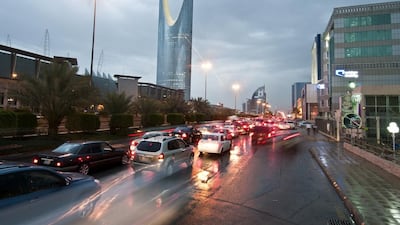Saudi Arabia is expected to deliver a budget on Thursday that will ease austerity measures but push ahead with efforts to reform subsidies and raise revenues.
The budget is expected to show that this year’s deficit was much lower than originally expected, at about 297 billion riyals (Dh290.78bn), or 12.5 per cent of GDP, compared with 14 per cent of GDP in the original budget. This gives the government scope to raise spending in the year ahead while reducing the budget deficit target further, to 239bn riyals, sources told Reuters.
The focus will be on the balance the government strikes between spending restraint, revenue raising and reform as it deals with oil prices that it is budgeting to be only slightly higher next year, while also seeking to maintain momentum in transforming its public sector-dependent economy into one that is more dynamic and entrepreneurial.
“The key point is that it looks like the composition maybe changing from outright spending cuts towards more revenue-raising measures”, including further subsidy cuts, said Jason Tuvey, an economist who covers Saudi Arabia at Capital Economics in London.
The government in its National Transformation Program in the spring said that it aims to save as much as 200bn riyals by 2020, by eliminating fuel and water subsidies. Last year, it began the process by sharply raising the price of fuel, including an increase in regular petrol to 0.90 riyals a litre from 0.60 riyals, although that is still among the lowest in the world.
“If they moved to the UAE market formula [on petrol and diesel] that would be a massive statement of intent from the government,” Mr Tuvey said. “But I think that might be a step too far as they don’t want to hit households too hard.”
Indeed, the government is expected to announce details of a cash payments programme to support Saudis with lower incomes as part of its effort to ease the pain of economic transformation.
Overall, spending for next year is expected to be 890bn riyals, up 6 per cent from this year’s budgeted target of 840bn riyals (although closer to an 8 per cent increase from the actual spending of 825bn riyals).
Some of the other key things to look out for are:
• On the revenue side, details of the government’s plans to introduce a value added tax, which it has said it wants in place by early 2018. Also plans to introduce a “unified income tax” (to be levied on expatriate workers only).
• Any further details about plans to partially privatise the state oil company, Saudi Aramco. Deputy crown prince Mohammed bin Salman at the start of the year said some kind of public share offering would be a cornerstone of the kingdom’s reform plans, but there are still many questions surrounding the operation, including timing, the structure of the company to be floated, the size of the flotation and the location of any listing.
• Any clues about the government’s views on oil market conditions next year. Speculation suggests the budget assumes an average price next year for the world benchmark, North Sea Brent, of US$50 a barrel, against about $45 this year. The government usually takes a conservative view on oil prices, which are ending the year in the mid-$50s, with most leading forecasters expecting improvement next year. Government revenue this year totalled 528bn riyals, slightly higher than the 514bn riyals originally budgeted.
• On the spending side, what is budgeted for major infrastructure and transportation projects? Infrastructure and transportation spending was cut by about 60 per cent this year after a 30 per cent cut the year before. The government has announced cuts to high ranking officials’ salaries and public sector bonuses, and any public sector employment measures will be closely watched.
• What are the government’s borrowing plans for the coming year? After its $17.5bn international bond offering in October, the largest ever by an emerging market country, it temporarily suspended domestic bond sales, which fund most of the deficit. With interest rates rising internationally, will the kingdom announce plans to raise more funds on international capital markets or expect to fund its smaller deficit domestically?
amcauley@thenational.ae
* with agencies
Follow The National's Business section on Twitter

